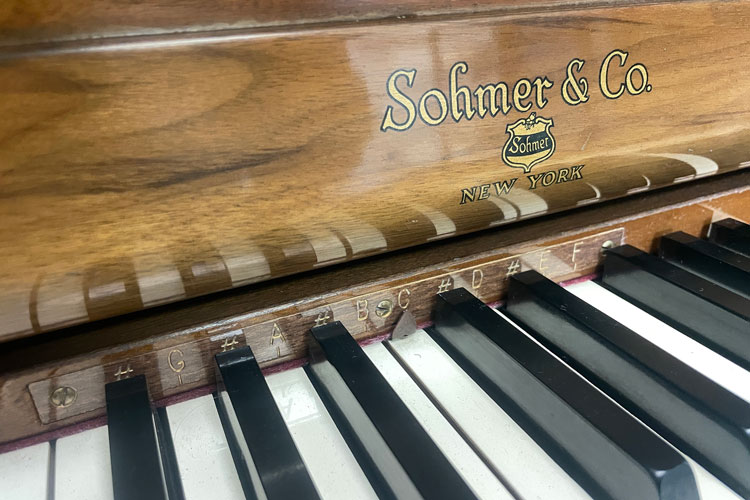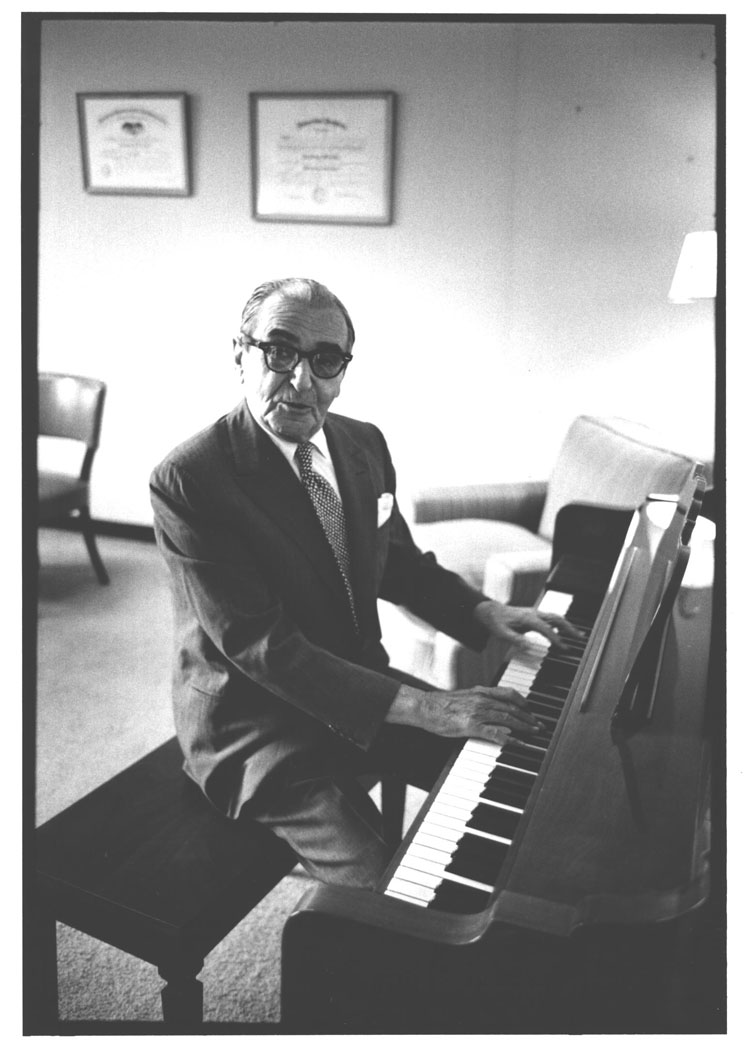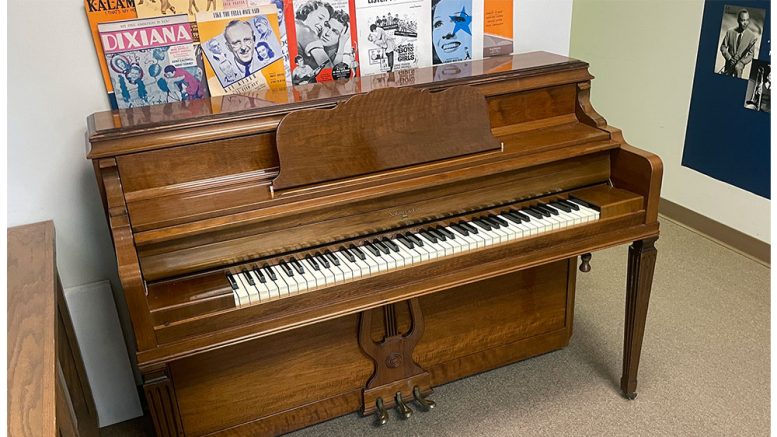Rare transposing instrument to be displayed during holiday theater production
As the air fills with the familiar strains of Bing Crosby’s “White Christmas” – the best-selling pop single of all time – the Great American Songbook Foundation is unveiling a piece of music history once owned by the man who wrote it.
Irving Berlin, a Jewish immigrant from Russia, revolutionized American popular music with many classic songs that have become part of the fabric of our culture: “Blue Skies,” “Cheek to Cheek,” “Puttin’ on the Ritz,” “There’s No Business Like Show Business,” “Anything You Can Do,” “Happy Holiday,” “I’ve Got My Love to Keep Me Warm” and even “God Bless America,” to name just a few.
His success came despite interesting personal limitations: Berlin did not read or write music, and as a self-taught pianist, he preferred playing on the black keys, corresponding to the key of F-sharp. As time went on, he commissioned piano makers to build transposing instruments – pianos with mechanisms enabling the player to shift the keyboard left or right and play in any key without changing hand position.
One of those rare instruments was donated recently to the Songbook Foundation’s vast Songbook Library & Archives by Berlin’s family. Built circa 1955 by Sohmer & Co. of New York, it is a well-constructed but simple upright piano with a twist: a transposing lever mounted under the keyboard.

A lever beneath the keyboard allows the player to change keys without changing hand position. (Photo provided by Great American Songbook Foundation)
After some restoration work at Piano Solutions in Carmel, the unusual instrument is back at the Songbook Library & Archives, near the Songbook Foundation’s headquarters at Allied Solutions Center for the Performing Arts. Later this month, it will be publicly displayed for the first time in conjunction with Civic Theatre’s production of White Christmas at the center’s Tarkington theater, a musical adaptation of the 1954 Bing Crosby film that features 17 songs by Berlin.
Kept in the songwriter’s New York office, the piano was one of three Sohmers left to Berlin’s three daughters after his death in 1989. His daughter Mary Ellen Barrett died in 2022 and passed it down to her daughter Elizabeth Matson, who donated it to the Songbook Foundation.
“I learned about the Great American Songbook Foundation a few years ago, and knew right away it would be the perfect place to donate this treasured family heirloom,” Matson said. “There could be no better place for Irving Berlin’s special instrument than in this museum devoted to celebrating the legacy of all the Great American Songbook writers.”
Songbook Foundation Executive Director Christopher Lewis said the priceless artifact will receive the respect and attention it deserves.
“Few artists exemplify the American Songbook more than Irving Berlin,” Lewis said. “We are eternally grateful to the family for entrusting us with this historic instrument, and to the Piano Solutions staff for their expertise in helping us to preserve it. This piano will soon have a prominent place in our Songbook Exhibit Gallery at the Palladium, and it ultimately will be a highlight of our planned music museum and visitor experience.”

A meter alongside the keyboard shows which key is engaged at a given time. (Photo provided by Great American Songbook Foundation)
Piano Solutions owners Greg Durthaler and Brian Hostetler have serviced several historic pianos for the Songbook Foundation, including instruments owned by songwriters Harold Arlen (“Over the Rainbow,” “Stormy Weather”), Johnny Mercer (“Moon River,” “Hooray for Hollywood”) and Richard Whiting (“On the Good Ship Lollipop,” “Ain’t We Got Fun?”).
Despite their decades in the business, however, the Berlin instrument was the first transposing piano they had worked on. They described the project as a “conservation” job, returning the long-dormant instrument to its original working condition with a minimum of replacement parts. The piano had to be dismantled to a large extent, with the keyboard removed to reveal the machinery within. The meticulous work included regluing joints and cleaning and lubricating scores of small parts, rebuilding rather than replacing any broken or worn elements. The wooden case was deep-cleaned and treated for mildew but not refinished.
The first priority was to figure out how the transposing mechanism was designed and how to get it working again. Hostetler deduced that the piano’s central pedal had to be pushed all the way down to allow the lever and the keyboard to move freely, sliding left or right in increments to cover the 12 keys of Western music. A small brass plate with markings indicates the current key.
“It’s ingenious, but it also can cause problems if you’re not really careful with it,” Hostetler said. “Over the years, the device can actually break parts that you don’t want broken.”

A 1970s photo shows Berlin playing the piano that is now preserved at the Songbook Library & Archives. (Photo provided by Great American Songbook Foundation)
Now fully functioning, the Berlin piano will be viewable publicly for the first time during the Dec. 20-21 final weekend of Civic Theatre’s White Christmas at the Tarkington. The lobby display also will include other relevant items from the Songbook Library & Archives, including an original promotional poster for the movie, a written arrangement of “White Christmas” owned by co-star Rosemary Clooney, and a snow globe gifted by Berlin to Clooney as a memento of the production.
The piano also will be employed for a tune at the Songbook Foundation’s upcoming presentation Songbook Academy Sings the Songs of the Season, with two sold-out concerts by Songbook Academy alumni scheduled Dec. 22 at the center’s Studio Theater.

